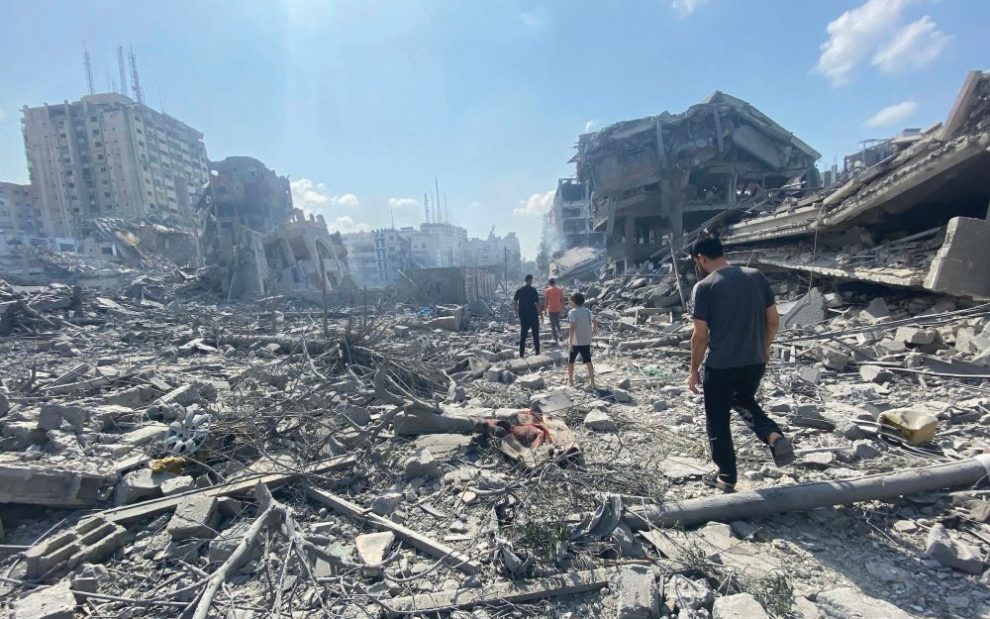Israel’s total war on the Palestinian people of Gaza, initiated in response to a terrorist raid by Hamas militants, began its fifth month in February. By then, Israeli attacks had killed more than 25,000 people, two-thirds of whom are women and children, and something in the vicinity of 70 percent of the housing stock of Gaza had been destroyed or rendered uninhabitable.
The human suffering was enough to provoke the South African government to file an application with the International Court of Justice (ICJ) in the Hague, the Netherlands, charging that the State of Israel is conducting a genocide against Gaza’s Palestinians because of its indiscriminate use of force, intentional civilian dislocation, and destruction of civilian infrastructure in its conduct of the war on Hamas.
Israel vigorously defended itself against these serious charges, and an interim ruling demands Israel take all possible measures to prevent genocidal acts, prevent and punish incitement to genocide, and ensure the provision of aid to civilians. The drama in the Hague spotlights the moral and political power of international law to curtail human rights violations and restrain governments from their worst impulses. Those international laws and norms offer hope that it could be the rule of law and not pure power that guides the behavior of governments.
Pope Francis has been a consistent supporter of multilateral entities such as the ICJ. Speaking to the Holy See’s diplomatic community in an annual New Year’s address on January 8, the pope called for a greater effort by the community of nations to “defend and implement humanitarian law, which seems to be the only way to ensure the defense of human dignity in situations of warfare.” The Holy See has long been a supporter of the role of international bodies, whether they are intended to mitigate the worst impacts of conflict or build multilateral responses to issues of global concern like immigration or care of creation.
The United States, despite much rhetorical support for the rule of law, remains a hold-out on many international statutes and conventions that it perceives as handcuffs on its use of force. Critics say it is hard to take the United States’ alleged esteem for international law seriously when it so frequently violates those norms in its deployment of U.S. power. Other major global powers likewise prefer a do-as-I-say-not-as-I-do policy.
Does it matter? The United States and Russia refused to sign treaties abolishing land mines and cluster bombs. Now Ukraine is awash in those antipersonnel devices. Ukraine’s contamination is so extensive that if the war ended tomorrow, it would still take decades for a complete cleanup, if that is even possible. More worrying is the fact that when major global powers exempt themselves from established war-making and humanitarian norms, there is a trickle-down effect to smaller regional actors.
Perhaps the world’s most powerful democracy must accept that norm-setting role. It would mean respecting decisions from bodies like the ICJ or the International Criminal Court even when they go against the United States. It would mean limitations in trade and military expansion and political power plays. Acts of pure self-defense, for example, would still be acceptable, but reprisal attacks to “restore order” in Syria and Iraq would likely be outlawed.
In the end, creating hard stops around international law may turn out not to be a handcuff but a blessing in disguise. America’s worst contemporary geopolitical failures and self-lacerations have often derived from those moments when overconfidence in its rightness of purpose and the overwhelming might and technological prowess of its military encouraged costly, mortal overreach. There are worse things than acknowledging a referee with the authority to order U.S. power to stand in a neutral corner.
This article also appears in the April 2024 issue of U.S. Catholic (Vol. 89, No. 4, page 42). Click here to subscribe to the magazine.
Image: Palestine New Agency













Add comment